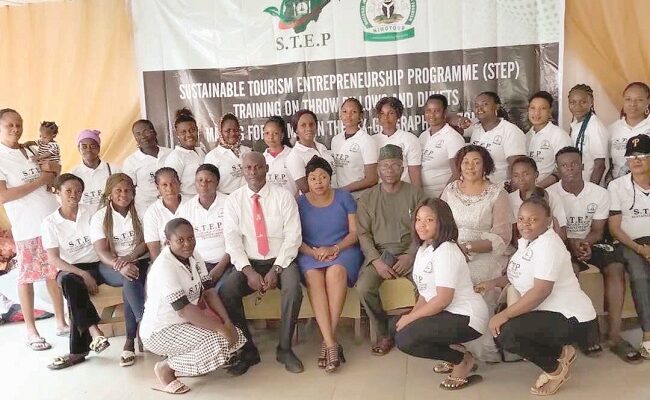
THE National Institute for Hospitality and Tourism (NIHOTOUR) recently commenced the pilot-phase of its Sustainable Tourism Entrepreneurship Programme (STEP) with the training and empowerment of indigent youths and women.
According to NIHOTOUR, the STEP initiative will stimulate tourism entrepreneurial growth and sustainable development of Nigeria’s tourist host communities. The STEP is now a project implemented across the six-geopolitical zones, with a kick off on December 5, to run through the end of the year into 2023.

The pilot-phase of STEP is providing full-funded training of displaced youths and women in the making of throw pillows and duvets, being part of the hospitality industry value-chain and tradecraft.
A total of 150 youths and women were empowered in NIHOTOUR campuses in Enugu, Benin, Lagos, Bauchi, Abuja and Argungu in Kebbi State.
Speaking with journalists in Abuja during the capacity-building programme, the Director-General of NIHOTOUR, Nura Sani Kangiwa, explained that the pilot-phase of the STEP training includes hospitality-trade up-skilling in soap making and the sustainability of start-up businesses in the sector.
He added that the training on soap-making will also be done in the coming weeks, at the 12 NIHOTOUR campuses and training centres across Nigeria.
It will be recalled that the Kangiwa-led NIHOTOUR had announced that the STEP programme is a novel concept of tourist host community poverty reduction and manpower development.
The STEP project was designed to train, equip and mentor trainees on hands-on skills and entrepreneurial capacities for successful operation of small businesses (start-ups) in Nigeria’s Tourism and Hospitality industry value-chain.
Statement posted on the STEP website stipulated that the “STEP will involve intense ‘learning-by-doing’ curricula where trainees will learn Tourism or Hospitality product development, services operation and the nitty-gritties of setting-up their personal business at the expiration of the programme.”
The STEP website also identified eligible beneficiaries for trainings as women – single, married or widowed; vulnerable youths – who are either orphans, abandoned or school drop-outs; physically challenged Persons; Internally Displaced Persons (IDPs); unemployed youths and jobless graduates from tertiary institutions.







